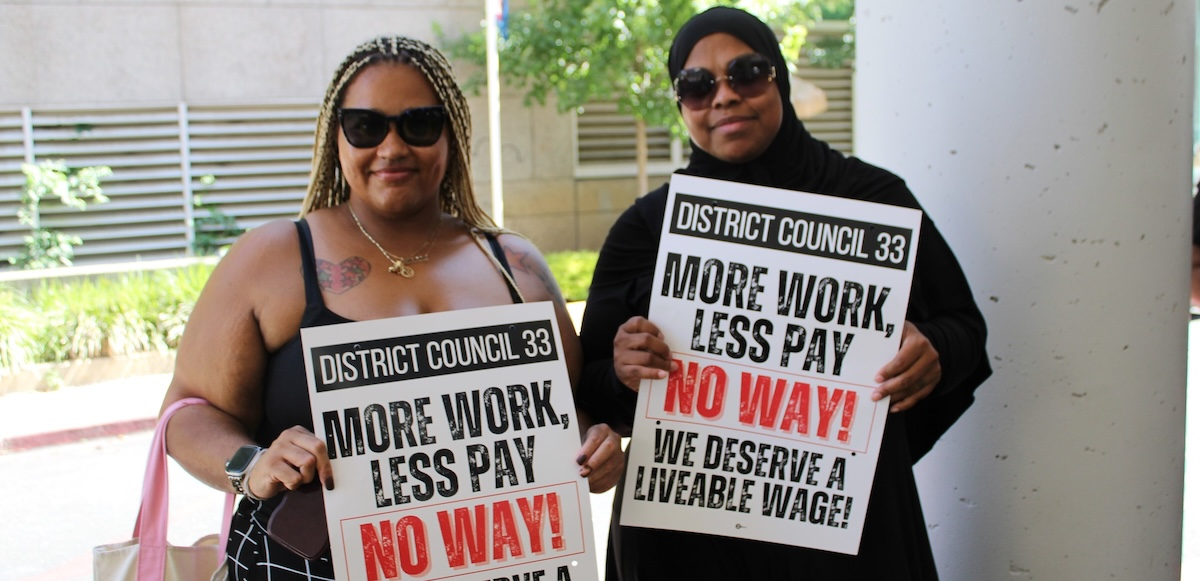Philadelphia Municipal Workers Strike Before July 4 Celebrations

Philadelphia municipal workers, including sanitation workers, crossing guards, 911 operators, and water department workers are on strike against work rule concessions and to demand pay increases that beat inflation. Photo: AFSCME District Council 33.
Nine thousand blue-collar workers who make Philadelphia run went on strike July 1. After sacrificing through the pandemic and years of bruising inflation, they say they’re on strike so they can afford to live in the city they serve.
Already, uncollected garbage is piling up as the workers, members of AFSCME District Council 33, defend their strike lines.
The COVID-19 pandemic brought the term “essential worker” into widespread use, but many experienced a gap between how they were talked about and how they were treated. They were called essential, but regarded as disposable.
In June 2020, at the height of the pandemic, hundreds of Philadelphia sanitation workers and other DC 33 members rallied to demand hazard pay and personal protective equipment. It was a sign that these workers from one of Philadelphia’s largest unions, who are underpaid and do exceptionally dangerous work, understood their real worth to society.
Five years later, AFSCME DC 33 is on strike for a contract that reflects the sacrifices they’ve made for the public. The strike could cause a major disruption to the city’s Fourth of July festivities planned for this weekend.
ESSENTIAL BUT MISTREATED
It’s hard to leave the house without experiencing the work that DC 33 members do. The union represents blue-collar city workers in a wide range of departments, including sanitation workers, water department employees, school crossing guards, police dispatchers (911 operators), and many more. The union’s slogan, “Philadelphia Works Because We Do,” is more than just rhetoric.
Despite their essential role for the city, the average salary for DC 33 members is only $46,000, and many are eligible for public assistance. “It’s been increasingly difficult for our members to find affordable housing inside the city of Philadelphia,” union president Greg Boulware told the Philadelphia Inquirer.
Unlike police officers or firefighters, DC 33 members are required to live inside the city limits.
The city’s measly starting offer of 2 percent annual raises would do nothing to address this problem, amounting to only an extra $925 per year. The mayor gave herself a 9 percent raise on a salary that’s already over five times the average salary of a DC 33 member.
CITY SEEKS CONCESSIONS
As of Monday, the city had only moved slightly to propose a three-year deal with annual raises of 2 percent, 3 percent, and 3 percent. They’re also seeking concessions on the union’s shop-floor power, like weekend and overnight work without paying overtime.
The union is pushing for meaningful yet modest gains that would improve the lives of its members. DC 33 is demanding an 8 percent annual raise, along with a $5,000 lump-sum payment for members who worked during the pandemic. Altering the residency requirement to allow workers to live outside the city after five years of service is another key issue.
Members had been working under a one-year contract extension that offered a 5 percent raise. The union maximized its leverage for that contract by threatening to strike in coordination with Transport Workers Union Local 234.

SUPPORT LABOR NOTES
BECOME A MONTHLY DONOR
Give $10 a month or more and get our "Fight the Boss, Build the Union" T-shirt.
AFSCME DC33 has a history of taking militant action, along with serving as a power base for Philadelphia’s black working class (the union is majority black). In the 1960s, sanitation workers organized slowdowns to protest the use of money set aside for the Streets Department to grant wage gains to the Fraternal Order of Police.
Credible strike threats and actual strikes led to historic economic gains for DC33 members in the 1970s and ’80s. Philadelphians still talk about the 1986 citywide strike, where 45,000 tons of “stinking, maggot-laced garbage” piled up across the city for twenty days. All of this took place under the union leadership of the controversial Earl Stout, who some argued was the most powerful black man in the city.
Black workers are disproportionately found in unionized public employment, which continues to be a haven for job stability. Municipal unions like AFSCME DC33 are a perfect example of this, and these public sector union fights are vitally important for furthering racial justice.
RALLIED WITH TRANSIT WORKERS AND TEACHERS
As the strike deadline approached, DC33 escalated pressure with a rally outside the negotiation site, followed by a strike sign-making event. On Monday, with only seven hours remaining before contract expiration, the union held a solidarity rally at city hall alongside the Transport Workers Union and the Philadelphia Federation of Teachers.
As COVID-era federal stimulus funding dries up, more urban areas might see similar labor fights in the years to come. It’s important that we mobilize public support for city workers and push back against the narrative that there’s just no money to be found.
“The city of Philadelphia has balanced their budgets and their books on the backs of our members for years,” DC 33 president Boulware said in a recent press conference. In a city where the University of Pennsylvania enjoys a $20 billion endowment without paying property taxes, there’s no reason this has to continue.
Paul Prescod is a labor organizer and member of the Labor Notes board. He lives in Philadelphia. This article first appeared in Jacobin.




You must log in or register to post a comment.